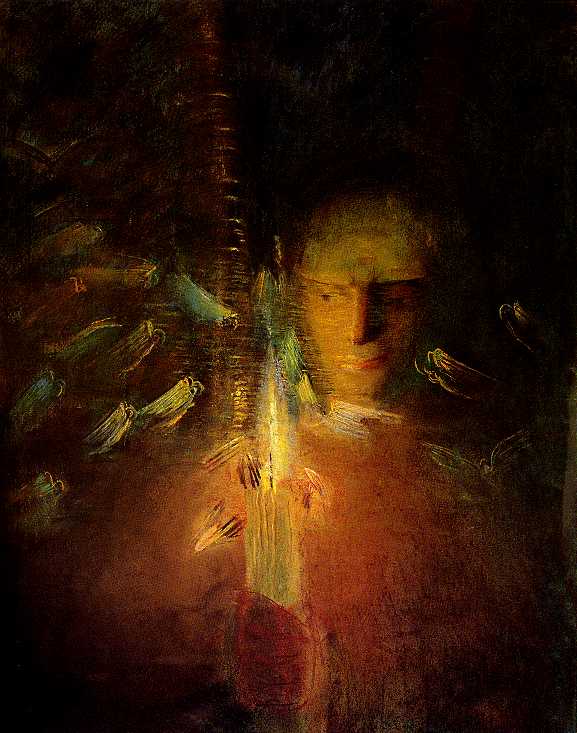Post by Ayinger on Dec 7, 2007 20:53:58 GMT -5

Six Organs of Admittance Shelter from the Ash
Found out about this being out a mere 2 hours ago and HAD to go pick it up just on the strength of the review below. W-O-W this is fuckin' nice beyond words though this AMG critic about nails it:
Review by Thom Jurek
It's clear from the very first moment of "Alone with the Alone," the opening track from Six Organs of Admittance's Shelter from the Ash, that this is a Ben Chasny record. The open-tuned drone — the layers of acoustic guitar wash creating an enormous backdrop of pure "sound" before the half-sung, half-chanted vocal — is a signature of sorts. It began happening on 2005's School of the Flower and came to fruition on 2006's Sun Awakens, but on Shelter from the Ash it's there from the jump — that sense of complete "otherness" that inhabits the best of Chasny's solo music. Loneliness and tension are never answered on this record, only expressed into the void without self-pity. Chasny is a guitarist first and foremost, but he's become a songwriter. These eight songs may not be able to be covered by anybody else, but they are wonderfully constructed, beautifully textured, and exquisitely played. "Alone with the Alone" has that tension in it that threatens to burst at the seams at any moment, especially when the electric guitar solos by Chas and Tim Green cut glass through the mix, screaming into the whirlwind. But they are answered by the sleight of hand that is "Strangled Road." His acoustic guitar and voice elegiacally intone: "The belief in life is a belief in love/A strangled road on the mountain/Will swallow your flimsy faith/The trinkets that you keep/Are just made of dirt/And colored gold/By the very men that you hate...." It's heady and dark, even aside from the sense of warning and menace held effortlessly within the poetry of the lyric. Elisa Ambroglio is on backing vocals, and Matt Sweeney playing blues licks on an acoustic solo puts the beautiful melody at odds with the intense and foreboding nature of the words. The spiritual warning here — about not becoming attached and being honest with oneself — is accented in the second refrain by the singers as Chasny's electric guitar reaches to break through his own thoughts. And on these first two tracks the beauty of this set is brought into full aural view.
Chasny's projects walk a tightrope with an abyss on one side and a fiery void on the other, between the dark side of human emotions and their willingness to consume us whole if we let them. This is one of the most darkly spiritual recordings out there. There is no preaching, only observation — pointed, unflinching, and all the more powerful because of those limited vocals of his. But of course it's that sound that envelops us, and allows us to take in the words. Album by album, Chasny has become increasingly more relaxed with this sound — so much so that now it's truly his own. He doesn't change it from record to record; if anything, he inhabits it more fully. The bowed cymbals in "Jade Like Wine" wrap themselves on the margins of Chasny's guitars and drones. His vocals follow that guitar toward an opening in the dark without knowing what's on the other side. He's the anti-Nick Drake. Perception is everything in Six Organs of Admittance's attack: it's enough to notice, to break down to the finest point, the leanest line, the smallest symbol, and allow it to stand for the whole — which, as music and words come together and look at one another across that space, is more than enough. This is some of the most solitary and lonely music in the world, not in a forlorn sense, but in a spiritual warrior's. "Coming to Get You" and the instrumental "Goddess Atonement" are the two hinge piece on the set, and as only fitting are dead center in the middle of the record. This is folk without folk, rock without rock — just pure shining musical darkness: "Did you tear what was once was tight/Or was it just me?/I can't tell between revelations/And the singularity/I'm coming to get you/And I will not let it hurt." The droning electric guitar by Ambroglio, the single-note lines by Chas, and the droning wall of feedback noise in the backdrop are threatening but utterly seductive. Gentleness and menace entwined, equal. When Noel Harmonson's drums drop in, all hell breaks loose and this becomes a screaming noisefest of wrangling electric guitars and feedback swirl.
On "Goddess Atonement," an instrumental, listeners are already in the aftermath of what just transpired. A wall of noise that sounds like mass screaming (in truth, field recordings from the Amazon) gets canceled out by an acoustic guitar — Chasny's chops are out of this world. He introduces this thing alone; he layers his electric in, and then drums and vibes, then Wurlitzer and the guts of a piano. It's a repetitive vamp, hypnotically underscoring the theme, which returns on a 12-string played almost frantically, and is answered by another acoustic guitar. The track is in its groove but never feels comfortable there, like it's always trying to escape. The set's longest cut, "Final Wing," weaves all the disparate elements together, and Chasny's singing reflects the depths of this space he's woven for himself and his listeners: "You lost/Your final wing/Never to grow back again/No change/No change from the dirt/To the sun/And wallowing back again/Claim time/From the wounds ripped in the sky...." The guitar sounds like a jet engine trying for the sound barrier and failing. It's hypnotically familiar but itchy, really uncomfortable, and therefore addictive. The title track follows with its wish for cover in the aftermath, though it's unclear just what emerges. All that's really left is sound. Hence, the final number, "Goodnight," with wordless vocals from Chasny and Ambroglio and an organ lining the margins. It's the only true calm in the acoustic and electric inner storm that is Shelter from the Ash. But once more, it's not a blessed-out calm, but more like one of surrender, resignation, and acceptance. Fate always has its way based on how we create its conditions. This shimmering little moment at the end of this disc is a beauty — just a single measure played over and over again for three minutes. Shelter from the Ash once more asks more from its listeners than is the norm, but as it asks, it also rewards. The mystery and dark majesty of this set will stand up to repeated listening years from now. It is a further delineation of his own sound and as such is a pure, if unsettling, delight.








 ??...NMH is a great rediscovery btw!!!!!.....(must play some olivia tremor control CDs)
??...NMH is a great rediscovery btw!!!!!.....(must play some olivia tremor control CDs)

